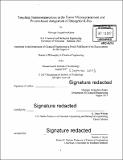Targeting immunosuppression in the tumor microenvironment and protein-based antagonism of oncogenic K-Ras
Author(s)
Kauke, Monique Jacqueline
DownloadFull printable version (40.10Mb)
Other Contributors
Massachusetts Institute of Technology. Department of Chemical Engineering.
Advisor
K. Dane Wittrup.
Terms of use
Metadata
Show full item recordAbstract
Cancer is routinely treated with surgery, chemotherapy, and radiotherapy, but in recent decades, two new modes of treatment have emerged, targeted therapy and immunotherapy. Targeted therapies exploit differences between cancerous and healthy cells, targeting the proteins and pathways that exclusively drive cancer cell growth, while immunotherapies harness the body's immune system to destroy cancer cells. With these new treatment strategies, tumor regression and complete remission of disease have become attainable for a larger subset of patients. Nevertheless, the fight against cancer continues to be met with significant challenges, including development of resistance to targeted therapies and immunosuppressive factors that cripple anti-tumor immune responses. Broadly, the work presented in this thesis focuses on the development of novel therapeutic cancer agents using protein engineering. First, we explore combination immunotherapies designed to simultaneously activate an anti-tumor immune response, using a tumor-targeting antibody and a serum-persistent form of the immunostimulatory cytokine interleukin-2 (IL-2), and reduce immunosuppression in the tumor microenvironment, via blockade of either transforming growth factor-p (TGF-[beta]) or phosphatidylserine. We performed in vitro characterization and extensive preclinical evaluation of our constructs in syngeneic murine tumor models but failed to show therapeutic efficacy. Our studies nevertheless contribute to the field and demonstrate the complex and interdependent nature of the immune system, something that must be considered in future endeavors in combination immunotherapies. In the field of targeted therapy, mutant K-Ras continues to be the holy grail of oncogenic targets, but remains undruggable due to its high affinity for activating nucleotide GTP and a lack of welldefined drug-binding pockets. We engineered a protein binder RI 1.1.6 that binds mutant K-Ras with nanomolar affinity and exhibits specificity over the wildtype protein. The work in this thesis further characterizes RI 1.1.6 and shows inhibition of K-Ras-driven signaling in a model system. Translation to human cancer cell lines, however, failed to recapitulate this RI 1.1.6-mediated signaling disruption. Mathematical modeling of Raf-competitive Ras antagonism by R11.1.6 revealed that insufficient inhibition of Ras-Raf complexes is attained, offering an explanation of the lack of biological effects we observed.
Description
Thesis: Ph. D., Massachusetts Institute of Technology, Department of Chemical Engineering, 2017. Cataloged from PDF version of thesis. Includes bibliographical references (pages 163-170).
Date issued
2017Department
Massachusetts Institute of Technology. Department of Chemical EngineeringPublisher
Massachusetts Institute of Technology
Keywords
Chemical Engineering.